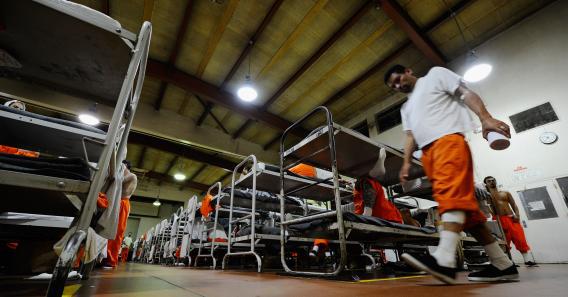How bad is the suicide crisis in California state prisons? Well, the expert hired by a federal court to help end it is quitting out of frustration, calling any future attempts on his part a “further waste of time and effort.” To be clear: It’s not that he thinks it’s a problem that can’t be solved, just that state prison officials aren’t interested in finding a solution.
Here’s Southern California Public Radio’s report with the details:
[Dr. Raymond] Patterson has analyzed inmate suicides in state prisons for more than a decade and made recommendations every year on how prison officials could reduce the suicide rate. In his report on 2012 suicides, Patterson wrote that his recommendations go “unheeded, year after year,” while suicides “continue unabated.” Patterson concluded that state prison officials just don’t care about the issue, and that making any more recommendations would be “a further waste of time and effort.”
Patterson has been making recommendations to the prison system for 14 years, and filed his latest report with the federal court system on Wednesday, according to the Los Angeles Times. That report paints a rather depressing picture of the California prison system: The state has 24 suicides for every 100,000 inmates, a rate that is climbing and already 50 percent above the national average. Inmates in segregation units were 33 times more likely to commit suicide. Of the first 15 suicides of 2012, three were discovered after the onset of rigor mortis, and 13 had indicators of “inadequate assessment, treatment or intervention.”
The state prison system responded with a statement yesterday denying Patterson’s claims that the prison system is turning a blind eye to the problem. “We adamantly reject this monitor’s suggestion that the state is indifferent to the issue of suicide prevention,” the California Department of Corrections and Rehabilitation said. “Far from it. California has one of the most robust prison suicide prevention programs in the nation.”
But the real issue seems to be that prison officials, along with Gov. Jerry Brown, don’t want federal oversight on the issue at all. The statement continues: “CDCR is identifying and implementing improvements on its own. We do not need further intrusive and costly federal court oversight.” In fact, U.S. District Judge Lawrence Karlton is set to rule later this month on the state’s bid to end federal oversight of mental health treatment in the prison system. We’re guessing this latest development won’t exactly be a boon to the state’s case.
For more on the mental health and overcrowding issues plaguing the state system, Southern California Public Radio has a piece with some good context.
